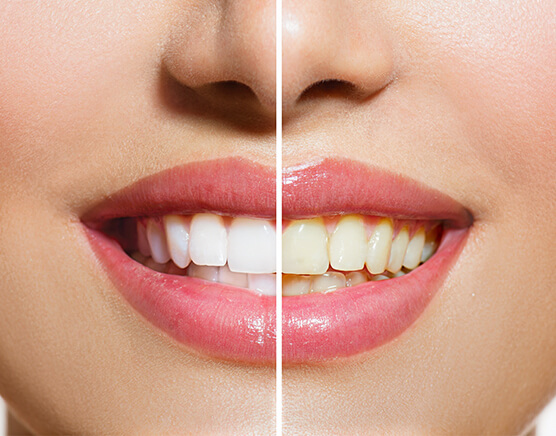Teeth whitening is a safe and easy way to brighten your smile and boost your confidence. It is one of the most popular dental procedures as it is a fast, easy and inexpensive solution for improving your smile and dramatically enhancing your appearance. As we get older, our teeth naturally tend to darken. However, this staining process is often sped up by certain foods, drinks and smoking. Teeth whitening can reverse or slow down this process.
If over time, you feel your teeth are not as bright as they used to be after cleaning, to remove any stains on the outside of your teeth, it may be suitable for you to brighten your smile by using teeth whitening in a specially designed Home Whitening Kit. The procedure is safe, simple, and more affordable than ever.
How Does It Work?

Teeth whitening is a cosmetic procedure that helps to lighten teeth by removing stains and discolouration. All teeth whitening products contain peroxide, either as carbamide peroxide (CP) or hydrogen peroxide (HP).
The peroxide in teeth-whitening products dissolves the organic stains in the tooth to change the colour and produce a whitened effect. This is achieved by entering the tiny pores of the enamel and dentin and breaking up the stains that block out light. More light passes through the teeth and makes them look lighter as the stains are broken into smaller and smaller pieces.
Whilst you can whiten your teeth at home with an over-the-counter treatment, you will achieve better results by using our professional service as our treatments typically contain a higher percentage of peroxide and are less abrasive, leading to more effective results without damaging your tooth enamel.
Teeth Whitening FAQs
1. What results can I expect?
This depends on a number of factors and results will vary between patients. Generally your teeth will return to their whitest shade before staining occurred. After whitening it is advised that you avoid substances that stain such as tobacco and red wine for about a week. This is because the pores in your teeth are open and your teeth are more receptive to staining factors after your teeth-whitening treatment. Your teeth may also feel slightly sensitive to very hot or cold foods and beverages.
2. How long will it take?
It may be case that you are happy with the result of the teeth whitening after a single use and you can happily stop if this is the case, most people on their first course of whitening see sustained improvement over a few sessions.
3. How long will it last?
Brushing and flossing regularly will help to maintain whiteness, and you can generally expect the results to last about 1-2 years – or even longer if you are a non-smoker and avoid foods that are known to stain teeth. Because teeth whitening is not permanent, you will need to maintain your bright smile with continued treatments. The real benefit of a home teeth whitening kit is that if you think the teeth have darkened over time or are not as bright as they were on completion of the treatment then, you have the ongoing ability to ‘top up’ or refresh the colour of your teeth from time to time.
4. Does teeth whitening hurt?
With the products we use we have experienced very few problems. Most people will get some form of sensitivity from teeth whitening, this is usually in the region of 80%. It is usually mild and normally full gone within 48 hours. By using the Colgate Max White gel,?? we have experienced reduced sensitivity during teeth whitening for our patients, however the teeth whitening gel opens up thousands of tiny ‘tubes’ in the enamel which heal after a short period but may allow cold into the tooth causing sensitivity. This resolves quickly and we provide our patients with many helpful tips and tricks to reduce this.
Some people who already have sensitive teeth do need to be careful with treatment but even then its a simple case of spacing out the treatment. You will most likely get the same result but at a slightly slower pace.
5. Will the gel whiten crowns, veneers and false teeth?
No, unfortunately the gels will only whiten natural dental tissue and will not work on restorations. Tooth-coloured fillings and crowns etc will need to be replaced after whitening if you wish all of your teeth to be the same colour. Your dentist can discuss the options, treatment plans and costs for this if this is a concern for you.
6. Are there any risks?
The side effects of teeth whitening can sometimes include short term tooth sensitivity and pain in the gums and tongue. There is also a possibility of over-whitening, resulting in a translucency that may appear grey from the shadows of the mouth. This is very rare and only occurs if the whitening process is over-extended. The peroxide in teeth-whitening products can burn your gums if they are not properly protected, which is another reason why it is recommended to leave your mouth in the hands of professional dentists and follow instructions properly.
7. How can I retain my white teeth?
You can extend the results of your teeth-whitening treatment by avoiding staining foods and beverages such as coffee, tea, red wine, soft drink and tobacco. If you can’t go without your morning coffee or afternoon wine, try drinking through a straw to avoid contact with your teeth as much as possible. It is also important to keep the mouth clean by brushing and flossing regularly.
If you would like a whiter, brighter smile then call 091 525797 to schedule an appointment.

